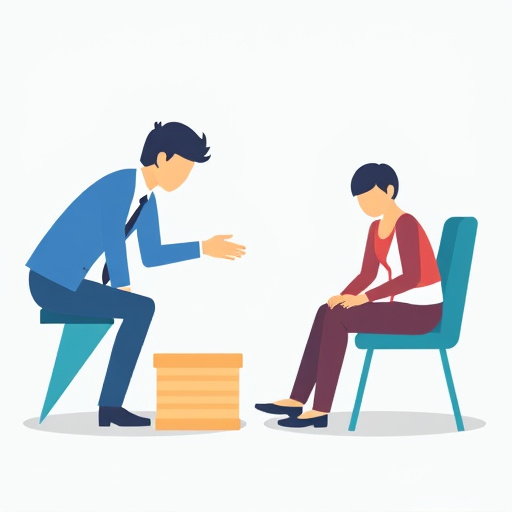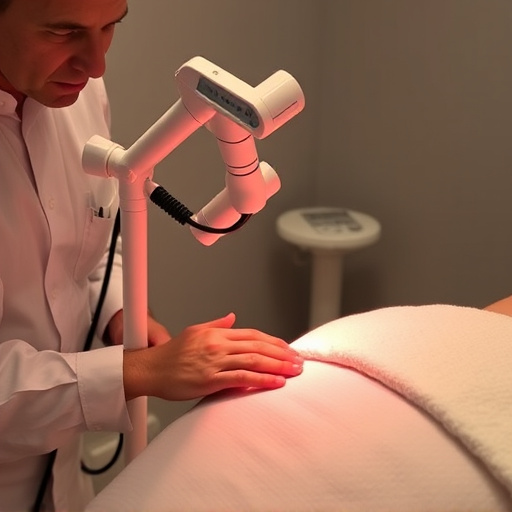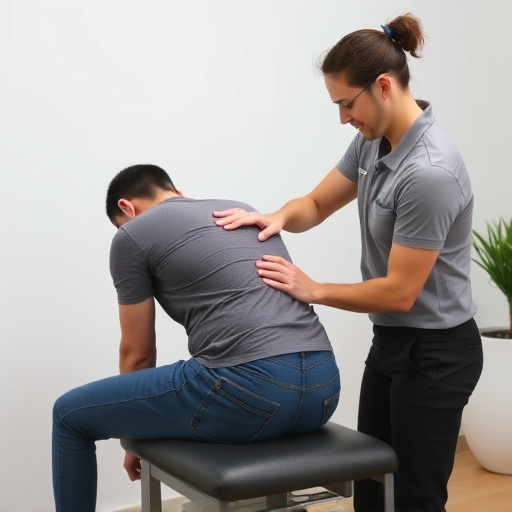Pinched nerves, caused by compression or injuries like herniated discs, lead to sharp pain, numbness, and weakness. Rest, ice therapy, and gentle stretching help immediate relief. Long-term strategies include good posture, exercise, ergonomic adjustments, and mindfulness for lasting pinched nerve relief.
Do you suffer from a pinched nerve? If so, you’re not alone. Pinched nerves can cause sharp pain and discomfort, but there are effective strategies to find immediate relief and prevent future occurrences. This guide breaks down the causes and symptoms of pinched nerves, offers safe, immediate steps for alleviating pain, and provides long-term strategies to keep your nerves healthy. Discover how to take control of your condition and experience lasting pinched nerve relief.
- Understanding Pinched Nerves: Causes and Symptoms
- Immediate Steps to Alleviate Pain Safely
- Long-Term Strategies for Preventing Reoccurrence
Understanding Pinched Nerves: Causes and Symptoms

Pinched nerves occur when a nerve is compressed or trapped, leading to discomfort and potential injury. This can happen due to various reasons such as repetitive motions, poor posture, or injuries like herniated discs. Symptoms often include sharp pain, numbness, tingling, or weakness in the affected area, which may radiate to other parts of the body. For instance, a pinched nerve in the neck could cause pain that extends down the arm.
Proper diagnosis is crucial for effective pinched nerve relief. If left untreated, it can lead to further damage and chronic pain. Seeking professional help, such as consulting a healthcare provider or physical therapist, can offer guidance on treatment options like rest, ice therapy, compression, elevation, and in some cases, advanced modalities like shockwave therapy for pain. Additionally, injury rehabilitation exercises may be recommended to restore nerve function and prevent future occurrences.
Immediate Steps to Alleviate Pain Safely

When experiencing pinched nerve symptoms, such as sharp or burning pain, numbness, or tingling, it’s crucial to take immediate action to alleviate discomfort safely. The first step is to stop any activity that might be causing or exacerbating the issue. Resting and avoiding movements or positions that trigger pain can help prevent further damage. Applying ice packs wrapped in a thin towel directly to the affected area can significantly reduce inflammation and numb the pain, providing temporary relief.
Additionally, gentle stretching exercises targeting the specific body part with the pinched nerve can offer therapeutic benefits. For instance, if experiencing lower back pain due to a pinched nerve, simple backward bending or pelvic tilts might help release pressure on the affected nerves. However, it’s essential not to overdo it; start slowly and listen to your body, stopping if any movement intensifies the pain. Headache relief can also be achieved through similar gentle techniques, focusing on relaxation and avoiding strenuous activities that could worsen the condition.
Long-Term Strategies for Preventing Reoccurrence

To prevent a pinched nerve from recurring, adopting long-term strategies is essential. Maintaining good posture while sitting and standing can alleviate pressure on nerves, especially in the back and neck regions. Regular exercises focusing on strengthening core muscles and stretching relevant areas can also provide joint pain relief and reduce the risk of reoccurrence. Ergonomic adjustments at home and work, such as using supportive furniture and taking breaks during prolonged periods of inactivity, are effective preventive measures.
Additionally, post-accident rehabilitation plays a crucial role in long-term recovery. Engaging in physical therapy sessions tailored to address specific issues can significantly reduce sciatica treatment needs and prevent future injuries. Incorporating practices like mindfulness and stress management techniques into daily routines may also help, as stress is known to contribute to muscle tension and joint pain.
Pinched nerve relief is achievable through immediate pain mitigation strategies and long-term preventative measures. By understanding the causes and symptoms of pinched nerves, you can take proactive steps to avoid further injury. Implementing these simple yet effective techniques will empower you to manage and prevent recurring episodes, ensuring a healthier future.














